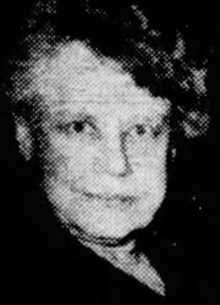|
Mary Greaves
Mary Greaves MBE (23 April 1907[1][2] – 16 January 1983)[3] was a British civil servant and disability rights campaigner,[4] who was instrumental in helping to pass the Chronically Sick and Disabled Persons Act 1970.[3][4] Following the death of its founder Megan du Boisson in 1969, Greaves became head of the Disablement Income Group.[4][5] Early life and careerMary Elsworth Greaves was born on 23 April 1907 at 83 Falmouth Road, Newcastle upon Tyne, the daughter of Joseph Elsworth Greaves and Mary Beatrice Heckels.[1] The family lived in Whitley Bay.[1] Both of her parents were teachers.[6] As a child, Greaves contracted polio, which left her severely disabled.[3] Initially fearful she would never find work, she gained increased freedom with a hand propelled tricycle and attended college.[1] Trained in shorthand, Greaves subsequently gained employment as a secretary at Whitley Bay Council. She later established her own successful shorthand and typing school from her parents' house.[1][3] Aged 35, in 1942, Greaves undertook a correspondence course in sociology with Ruskin College, and later completed a BSc in economics.[1] In 1945, now employed by the Ministry of Works, she studied part-time at the London School of Economics, obtaining a degree in sociology and statistics.[1] Greaves was a civil servant until her retirement, and was awarded the MBE.[7] CampaigningUpon her retirement from the civil service, Greaves "travelled about the country investigating employment opportunities for disabled people" (The Times).[3] This formed the basis of her 1969 book Work and Disability: Some Aspects of the Employment of Disabled Persons in Great Britain, described as an "invaluable reference book".[3][8] Reviewing it for The British Medical Journal, C.B. Wynn Parry wrote:
Following the death of Megan du Boisson, co-founder of the Disablement Income Group with Berit Moore, Greaves took on the role of director of the DIG.[10][11] She became known as a leading activist "in campaigns around employment, disability incomes, and mobility issues",[4] and played an active role in helping Alf Morris's private members' bill pass through Parliament to become The Chronically Sick and Disabled Persons Act in 1970.[3] Campaigner Peter Large later recalled that Greaves chaired the committee which helped with drafting the Act, providing briefs, and dealing with amendments.[4] The group under Greaves also campaigned for a national disability income.[12] "I don't want to sit at home having everyone be nice to me," she said in a 1973 interview. "I'd rather go out and do things and have people being nasty to me if they feel so inclined, and then I'll fight back."[6] Death and legacyMary Greaves used crutches and a wheelchair in her later years.[13] She died on 16 January 1983 in a London hospital, aged 75.[3] Her obituary, published in The Times, remembered her as "a woman of courage and good sense, who disliked above all things a sentimental approach to disability."[3] References
|
||||||||||||||||||
